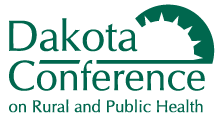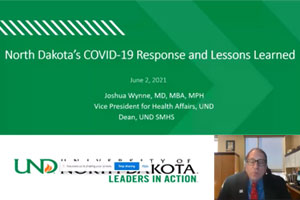Virtual Dakota Conference on Rural and Public Health Reaches a Large Audience
By Jena Pierce on
 The 36th Annual Dakota Conference on Rural and
Public Health took place virtually June 2-6, the
first time the event was not held in person, but it still
brought providers, administrators, public health leaders,
medical students, and other healthcare stakeholders from
across the state together. The nearly three-day
conference included four keynote addresses, 18
break-outs, eight intensive sessions, and a legislative
policy panel, along with 17 20-minute buzz sessions.
The 36th Annual Dakota Conference on Rural and
Public Health took place virtually June 2-6, the
first time the event was not held in person, but it still
brought providers, administrators, public health leaders,
medical students, and other healthcare stakeholders from
across the state together. The nearly three-day
conference included four keynote addresses, 18
break-outs, eight intensive sessions, and a legislative
policy panel, along with 17 20-minute buzz sessions.
Keynotes
Four featured speakers were brought in to talk about a variety of topics to the entire conference audience.
 A highlight
from the Dakota Conference was a keynote presentation by
Dr. Joshua Wynne, chief health strategist for North
Dakota and dean of the University of North Dakota (UND)
School of Medicine &
Health Sciences, titled "North Dakota's COVID-19
Response and Lessons Learned."
A highlight
from the Dakota Conference was a keynote presentation by
Dr. Joshua Wynne, chief health strategist for North
Dakota and dean of the University of North Dakota (UND)
School of Medicine &
Health Sciences, titled "North Dakota's COVID-19
Response and Lessons Learned."
"Over this past year," said Dan Kelly, CEO of the McKenzie County Healthcare Systems, "I have participated in more than a dozen presentations on COVID-19 from both state and federal presenters. Dr. Wynne's presentation on COVID-19 was logical and easily understood."
Dr. Wynne's presentation on COVID-19 was logical and easily understood.
"His use of graphics," Kelly continued, "aided the participant in understanding his message. If there were any naysayers in the audience, hopefully they went away from his presentation as believers. Overall I appreciated that the presentation was based on sound science and was factual."
Other keynotes included:
- "Understanding the Changing Needs of our Community, Partnering to Support the Health of the Whole Child Through COVID-19 and Beyond," presented by Kathy Anderson, MD, FAAP, CLC, CEIM, president of the North Dakota Chapter of the American Academy of Pediatrics.
- "Blind Spots: Riding the Waves of Diversity, Unconscious Bias and Change," presented by Kostas Voutsas, MBA, MS, HR/OD, professor of human resources at Dickinson State University, and corporate trainer.
- "Racism as a Public Health Problem," presented by Olihe Okoro, PhD, MPH, assistant professor with the College of Pharmacy at the University of Minnesota Duluth.
Topics
This year's conference had nearly 300 registered participants, which not only held steady to previous years, but slightly increased compared to recent years. Sessions covered a variety of topics important to healthcare and public health providers including:
- Public Health Ethics Balance the Public's Health with Individual Rights
- CHNA Implementation Ideas – Thinking Outside the Box
- Improving Population Health through Community Collaboration
- Targeted Rural Health Education – Students Making the Most of a Rural Experience
- Frostbite in January...Amputation in July?
It is a great networking opportunity for directors of nursing, as well as others.
Karla Spence, director of nursing at St. Andrew's Health Center in Bottineau, North Dakota, has attended this annual conference before. "The Dakota Conference gives insight into state and national information that is very beneficial to our Critical Access Hospital. It is a great networking opportunity for directors of nursing, as well as others."
Spence did miss the in-person experience but appreciated the opportunity to still attend the conference and learn more about healthcare in North Dakota.
"The virtual conference was good, since we were unable to gather for the conference, but my wish would be to have it in person," she said. "I feel that the conference has more meaning and I can get more out of the sessions in person. Networking is better in person. As well as it is more moral boosting in person."
Public Health
Many of the topics covered focused on public health. Brianna Monahan is the diabetes program coordinator for the North Dakota Department of Health and has attended the conference numerous times.
The Dakota Conference provides public health professions an opportunity to learn more of initiatives taking place around the state.
"The Dakota Conference provides public health professions an opportunity to learn more of initiatives taking place around the state," she said. "Staying informed on current efforts of other organizations helps reduce duplication and allows for partnership and pooling of resources across the state."
When asked what benefit she receives from the conference, she said, "I appreciate the chance to network with other public health professionals in the state and to learn what public health concerns are impacting North Dakotans outside of my immediate program focus."
Impact
Kelly has attended the conference for the last 10 years and sees the value to the state.
"The Dakota Conference is the only conference I am aware of that affords a multiplicity of focuses," he said. "An attendee can gain a public health perspective, a healthcare provider perspective, but also perspectives that one typically is not exposed to such as the Native American perspective. The conference impact will vary from person to person, but overall there is a wide base of topics covered and all participants will come away with an expanded knowledge base."
State organizations use the gathering of healthcare personnel to host annual meetings. The North Dakota Public Health Association and the North Dakota Rural Health Association both held their annual meetings during the conference.
Continuing education credits were available for participants registered for the conference. All presentation recordings are available for viewing online for those who registered for the conference.
2022 Dakota Conference
The 2022 conference will be held June 8-10 in Grand Forks, North Dakota.
The Dakota Conference is coordinated and facilitated by the Center for Rural Health (CRH) at UND School of Medicine & Health Sciences. The planning committee is a partnership among Altru Health System, CRH, North Dakota Public Health Association, North Dakota Rural Health Association, and the UND College of Nursing and Professional Disciplines.


 is the communications manager at the Center for Rural
Health at the University of North Dakota School of
Medicine & Health Sciences in Grand Forks.
is the communications manager at the Center for Rural
Health at the University of North Dakota School of
Medicine & Health Sciences in Grand Forks.



